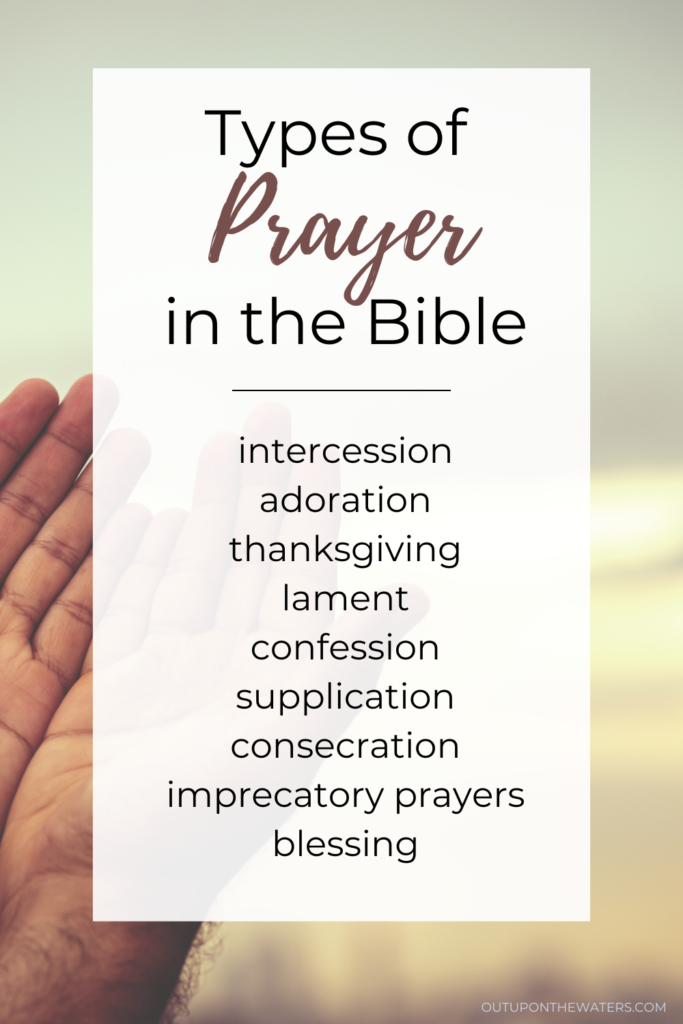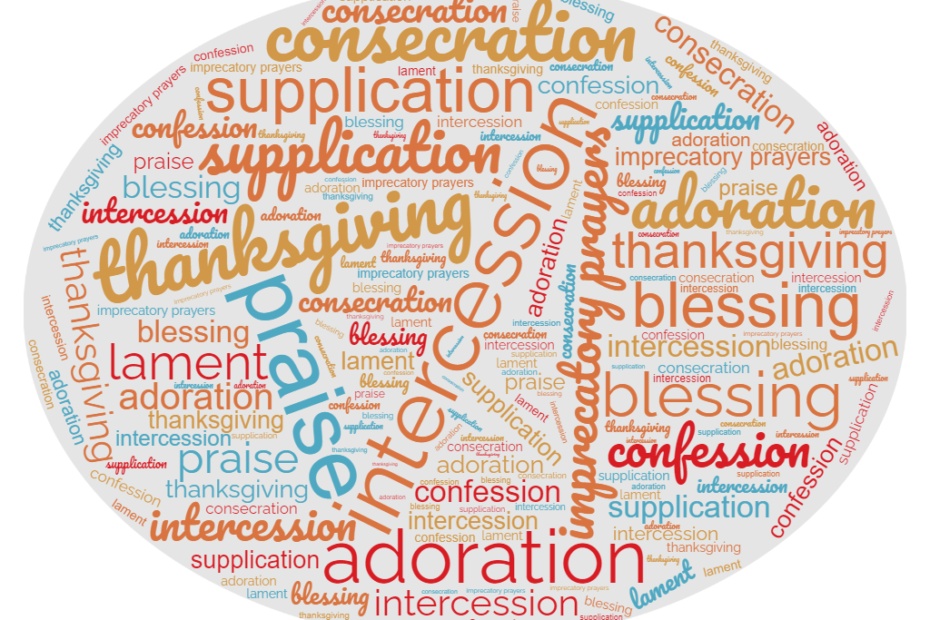This post contains affiliate links. Using these links means I may earn a percentage of the purchase at no extra cost to you. As an amazon associate, I receive a percentage of qualifying purchases. View our disclosure policy here.
There are many different types of prayer in the Bible, demonstrating the variety of ways in which we can enter into conversation with our Creator. There are prayers that express the full range of human emotion: prayers that ask for something, prayers that express gratitude, prayers of worship or adoration, commitments and confessions, prayers of lament that allow us to cry out to God in times of suffering and injustice.
In fact, there are many ways that we can divide up the types of prayer in the Bible. Ann Lamott wrote a very insightful book distilling different types of prayer into three main categories: help, thanks, wow. You can find her book right here.
Within these categories of “help,” “thanks,” and “wow,” we can distinguish further nuances in the different types of prayer that we find in Scripture.

Help, Thanks, Wow: The Three Essential Prayers
Buy Now →Here is a list of 9 different types of prayer in the Bible, and how each prayer connects us to God.
- intercession
- adoration
- thanksgiving
- lament
- confession
- supplication or petition
- consecration
- imprecatory prayers
- blessing

Types of Prayer in the Bible
Here are nine types of prayer that we find in the Bible, along with Scripture verses and how we can use these prayers in our own lives.
1. Prayers of intercession
Intercessory prayers ask for something on behalf of someone else. We are urged, in Scripture, to pray for other people (including our “enemies”). Whenever you bring the needs of someone else before God, you are engaging in intercessory prayer. You can pray for your friends, family, co-workers, your boss, your city, people in leadership positions, people you don’t like (this works really well for changing your own heart!), those around the world….
1 Timothy 2:1-2 – First of all, then, I urge that supplications, prayers, intercessions, and thanksgivings be made for all people, for kings and all who are in high positions, that we may lead a peaceful and quiet life, godly and dignified in every way.
Matthew 5:44 – But I say to you, Love your enemies and pray for those who persecute you.
2. Prayers of adoration
Prayers of adoration (also known as prayers of praise) are different from prayers of thanksgiving. Prayers of adoration are about adoring God for who He is, not just for what He has done. It’s an expression of love and admiration for God’s nature and attributes. This type of prayer is perhaps best summarized in the word “Wow!”
Whenever we think, Wow! God, you are so good. Or God, you are so powerful. Or God, it’s amazing how you provide for your creation. These are prayers of adoration. We might choose to focus on God’s strength and power when we see a storm roll in. Or we might marvel at God’s provision during a nature walk, or when the very thing that we need comes through.
Psalm 150 – Praise the Lord. Praise God in his sanctuary; praise him in his mighty heavens. Praise him for his acts of power; praise him for his surpassing greatness…. Let everything that has breath praise the Lord.
3. Prayers of thanksgiving or gratitude
This type of prayer expresses gratitude and thanks to God for His blessings and goodness. Simply saying “thanks” to God for the good things in your life is a prayer of gratitude. You can also keep a gratitude list, which is a great reminder of all the good things in your life, when God has pulled through for you in the past, and a great way to wire your brain to focus on the positive.
You can also express gratitude for challenges in your life, and for opportunities for growth. We don’t have to be thankful for the crummy stuff in life, but we can be thankful in spite of the crummy stuff, and we can be thankful that God is faithful even in the dark times.
1 Thessalonians 5:18 – give thanks in all circumstances; for this is God’s will for you in Christ Jesus.
4. Prayers of lament
Prayers of lament are like cries to God in times of suffering. A lament is a “passionate expression of grief or sorrow”. We find this type of prayer often in the Psalms, and Jesus himself prayers a type of prayer of lament in the garden of Gethsemane when he cries out in grief over the suffering that he knows is coming.
A prayer of lament is an honest expression of our sorrow to God.
Psalm 130:1 – Out of the depths I cry to you, O Lord; Lord, hear my voice!
Psalm 6:3 – My soul is in deep anguish. How long, Lord, how long?
Psalm 10:1 – Why, Lord, do you stand far off? Why do you hide yourself in times of trouble?
Prayers of lament teach us that we can bring our doubts and sorrows to God. We do not always have to focus on the positive. We can cry out in times of suffering and simply tell God how much of a difficult time we are having.
5. Prayers of confession
A prayer of confession is when you confess your sins and shortcomings to God. Importantly, prayers of confession are not just sitting and listing before God the things that we have done wrong. Prayers of confession can also be identifying a character trait that you want God’s help in changing.
Perhaps I didn’t give to the homeless person I encountered on the street last week. I might ask God to help me to be more generous and to trust Him for provision (so that I may give more easily). Perhaps I yelled at my kids the other day. I might ask God to make me more patient and more empathetic.
Prayers of confession are, at their core, a recognition of the brokenness in the world and the brokenness within ourselves, and asking God to turn us more and more into the heavenly creatures he always intended us to be.
James 5:16 – Therefore, confess your sins to one another and pray for one another, that you may be healed. The prayer of a righteous person has great power as it is working.
1 John 1:9 – If we confess our sins, he is faithful and just to forgive us our sins and to cleanse us from all unrighteousness.
6. Prayers of supplication or petition
Supplication means earnestly asking, and a petition is a formal request. This type of prayer is asking God to provide for your own needs. We can ask for God’s help in anything, and Jesus Himself urges us to prayer for our daily needs.
Philippians 4:6 – Do not be anxious about anything, but in every situation, by prayer and petition, with thanksgiving, present your requests to God.
7. Prayers of consecration
A prayer of consecration is a prayer of dedication or commitment. This prayer is prayed when believers dedicate themselves, or something else, to God’s service. It might be prayed during a baby dedication, or when someone first moves into a house. It is also used during the ordination of priests, and a prayer of consecration is prayed over the Eucharist during Holy Communion.
Jesus prayed a type of consecration prayer in the Garden of Gethsemane when He said, “Not my will, but Yours be done,” committing himself to the Father’s plan.
Exodus 13:2 – Consecrate to me all the firstborn. Whatever is the first to open the womb among the people of Israel, both of man and of beast, is mine.
Exodus 30:30 – You shall anoint Aaron and his sons, and consecrate them, that they may serve me as priests.
Joshua 3:5 – Then Joshua said to the people, “Consecrate yourselves, for tomorrow the Lord will do wonders among you.”
8. Imprecatory prayers
Imprecatory prayers are appeals to the justice of God and that invoke judgement or curses upon one’s enemies (or the enemies of God). Imprecatory prayers were often prayed in times of crisis, calamity, or distress. We find many examples of this type of prayer in the Old Testament, especially in the Psalms.
In light of Jesus’ example in the New Testament, and how He teaches us to pray, Christians should be careful using imprecatory prayer. Perhaps a more Christ-like way to use imprecatory prayer is not to ask God to curse our enemies, but rather to pray for God’s judgement to come against the forces of evil, to pray for an end to homelessness, war, greed, violence, human trafficking, drug trafficking…
Psalm 7:6 – Arise, Lord, in your anger; rise up against the rage of my enemies. Awake, my God; decree justice.
Psalm 35:8 – …may ruin overtake them by surprise – may the net they hid entangle them, may they fall into the pit, to their ruin.
One important thing that we learn from imprecatory prayer is that God can take even our most fiery anger. We do not have to shy away from showing the depth of our emotions where we are talking to God in prayer.
9. Prayers of blessing
Prayers of blessing are words that we speak over a person (or a thing) that invoke God’s power and purpose in their lives. These prayers often begin with “May you…” or “You are”. Using the person’s name in the prayer can be powerful, as can a simple touch like a hand on a shoulder.
We see examples of parents praying a blessing over their child in the Old Testament, as in the case of Isaac blessing Jacob in Genesis 27:27-29.
Spoken blessings are words that impart power and purpose into someone’s life. They speak truth over someone, and they recognize the work that God is doing in that person. They declare the truths and promises of Scripture over a person’s life.
Do you want to learn to bless things (and people) in your own life? Here are prayers of blessing to pray over your home. (Doing a prayer walk through your home is a type of blessing.)
And here are prayers of blessing to pray over your children.
Numbers 6:24-26 – The Lord bless you and keep you; the Lord make his face to shine upon you and be gracious to you; the Lord lift up his countenance upon you and give you peace.
Romans 12:14 – Bless those who persecute you. Don’t curse them; pray that God will bless them.
